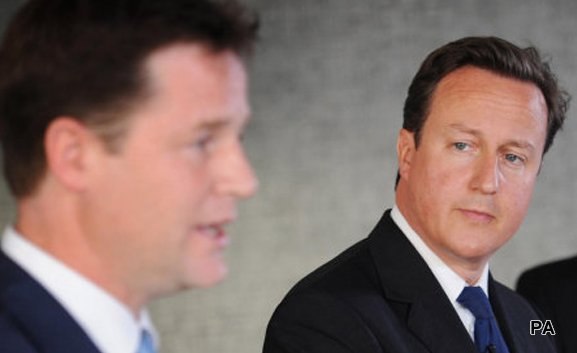52% Brits say Tories have gained most from Coalition but 45% say Lib Dems have kept deal more
The Tories have gained more from the Coalition than the Lib Dems, but Nick Clegg's party has kept to its side of the deal more than David Cameron's has, say the British people in our recent poll.
Meanwhile, almost half say they would like the Coalition to end immediately, with two thirds saying they would most welcome a fresh general election should the Coalition end within the year. These figures have roughly stayed the same since we last asked the question in mid-July; however the percentage of people who believe the Coalition will last less than a year has noticeably increased in the same time.
- 52% say the Conservatives have gained more from the Coalition; 23% feel the Lib Dems have
- Just 30% say the Tories have kept to their side of the deal; 51% say they have not
- Conversely, 45% say the Lib Dems have kept to their side of the deal and 32% say they have not
- One in five (20%) people think that the Coalition will last less than a year – this is up from 12% when we asked the same question in July
- However, similar percentages think that it will last anywhere from one to two years (23%), up until just before the next election (23%) or up until the next election (24%)
- 48% say they would like the Coalition to end immediately, with just 17% saying they'd like it to continue until the next election
- Finally, two thirds (66%) say that should the Coalition end during the next year, they would like to see a fresh general election; 22% say they'd like the Tories to continue as a minority government regardless
The Coalition agreement was drawn up between Prime Minister David Cameron and Deputy Prime Minister Nick Clegg when the 2010 General Election failed to provide a majority government result, and Clegg chose to align his party with the Tories. At the time, David Cameron said the Coalition would "take Britain in a historic new direction [with] conviction and common purpose", while Clegg stated it would be a "bold, reforming government".
Yet the Lib Dem leader has had a bumpy ride ever since, seeing his approval ratings and support plummet from the highs he enjoyed during the 2010 television debates, and has faced strong opposition on key Lib Dem issues, such as University tuition fees, which sparked widespread and violent protests two years ago.
More recently, however, the Coalition has appeared on increasingly shaky ground after the two parties strongly disagreed with each other over the issues of Lords reform and boundary changes. The Tories first said they could not support Clegg's Lords plans, after which Clegg instructed his party not to back the Tories in their planned attempts at electoral boundary changes – a move that many commentators saw as direct retaliation.
Clegg himself was reported as saying the Coalition was "broken" and that the Tories were trying to "pick and choose" which elements of the initial agreement they wanted to support.
And while David Cameron responded to the dispute by continuing to back plans for reform, suggesting that "it is a very sensible proposal", Lib Dem Foreign Office minister Jeremy Browne rejected the idea the Coalition was broken in an interview with the Today programme on BBC Radio 4 early this month.
"All of these claims about the Coalition being on its last legs are simply not true," he said.









